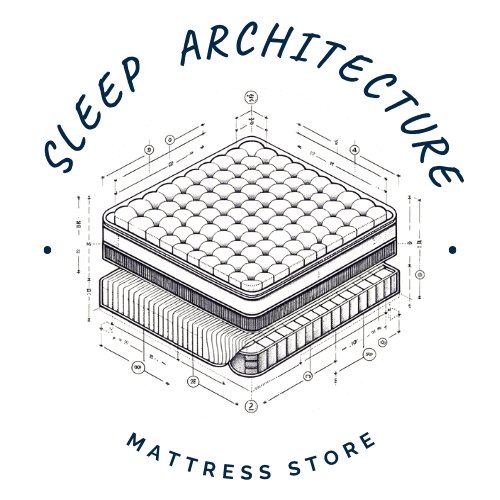
The Best Mattress Types for People with Allergies

For allergy sufferers, getting a good night's sleep can feel like a challenge. Mattresses, unfortunately, can attract dust mites, mold, and other allergens, which can trigger uncomfortable symptoms like sneezing, congestion, and itchy eyes. But don’t worry! Choosing the right type of mattress can make a big difference, helping you breathe easier and sleep better. Here’s a guide to the best mattress types for people with allergies and some tips on keeping your mattress allergen-free.
1. Memory Foam Mattresses
Memory foam is an excellent choice for allergy sufferers because it’s dense, which makes it difficult for dust mites to penetrate. Dust mites thrive in soft, fibrous materials, but the density of memory foam gives them fewer places to burrow into, reducing the likelihood of an infestation.
Tip: Look for memory foam mattresses that are CertiPUR-US® certified, ensuring they’re free from harmful chemicals and VOCs (volatile organic compounds) that could further irritate allergies.
Recommendations: M LILY WellFlex 1.0 Mattress; M LILY WellFlex 2.0 Mattress
2. Latex Mattresses
Natural latex is naturally resistant to dust mites, mold, and mildew, making it one of the best choices for allergy-prone individuals. Latex mattresses are hypoallergenic and antimicrobial, meaning they repel common allergens while offering excellent breathability and support.
When choosing a latex mattress, you’ll find two main options: natural and synthetic latex. Natural latex is preferable for those with allergies, as it’s made from natural rubber, while synthetic latex might contain chemicals that could trigger sensitivities.
Tip: Make sure your mattress is 100% natural latex for the best results, and check for certifications like OEKO-TEX® Standard 100, which guarantees no harmful chemicals.
Recommendations: Posh + Lavish Reveal, Restoreand Refineall-natural latex mattresses
3. Hybrid Mattresses with Anti-Allergen Covers
Hybrid mattresses combine different materials, such as memory foam and innerspring coils, to provide a balance of comfort and support. Some hybrid mattresses come with hypoallergenic, dust-mite-resistant covers, making them an option for those with allergies. Look for hybrids that use high-density foams and natural materials to further reduce allergen build-up.
Tip: Check the cover material before purchasing. Organic cotton, bamboo, or antimicrobial-treated fabric covers offer added protection against allergens and dust mites.
Recommendations: Kingsdown Silver Sage Ultra Plush Euro Top mattress, Silver Sage Cushion Firm Euro Top mattress, Silver Sage Ultra Firm Tight Top mattress, Belle Glade Firm Tight Top mattress, Belle Glade Plush Tight Top mattress, and the Kingsdown Belle Glade Firm Euro Top mattress
4. Innerspring Mattresses with Allergy-Proof Covers
Although innerspring mattresses tend to be more breathable due to the open coil structure, they can accumulate dust and allergens more easily than other types. However, with a hypoallergenic cover and regular maintenance, they can still work for allergy-prone sleepers. Look for innerspring mattresses with encased coils for added support and reduced allergen build-up.
Tip: Choose an allergy-proof mattress encasement or cover that fully encloses the mattress to prevent dust mites and other allergens from getting inside.
Recommendations: PureCare OmniGuard Advance Mattress Protector, Purecare Cooling Mattress Protector
5. Gel Memory Foam Mattresses
Gel memory foam mattresses are similar to traditional memory foam but infused with cooling gel. These mattresses are beneficial for people with allergies, as they offer the same dense structure that prevents dust mites from burrowing. Additionally, they often come with hypoallergenic covers to prevent allergen build-up.
Recommendations: BedTech Gel Max 12” Mattress, Magniflex Magnicool Gel 12” Mattress, Blu Sleep Conforma Prime Mattress
Additional Tips to Keep Your Mattress Allergen-Free
Choosing an allergy-friendly mattress is a great first step, but maintaining an allergen-free sleep environment is equally important. Here are a few simple tips:
· Use a Hypoallergenic Mattress Protector:A good mattress protector creates a barrier between you and the mattress, preventing allergens from reaching the mattress surface. Wash the protector regularly for optimal results.
· Wash Bedding Regularly: Sheets, pillowcases, and other bedding should be washed in hot water at least once a week to kill dust mites and remove allergens.
· Avoid Humidity: Dust mites and mold thrive in humid environments. Keep the humidity in your bedroom below 50% with a dehumidifier or air conditioner to prevent allergen growth.
· Vacuum the Mattress: Regularly vacuuming the mattress surface can help remove dust and allergens. Be sure to use a vacuum with a HEPA filter to capture allergens effectively.
Conclusion
For allergy sufferers, the right mattress can make all the difference in getting a restful and comfortable night’s sleep. Memory foam, latex, and hybrid mattresses are excellent options, thanks to their resistance to allergens and dust mites. When paired with a hypoallergenic mattress protector and good maintenance habits, these mattresses can help you enjoy a healthier, allergy-free sleep environment.
Whether you need a new mattress or just some expert advice, visit our store, where our sleep specialists are always here to help you find the perfect mattress for your needs. Sleep well and breathe easier—every night. See our selection now at www.sleeparchitecturemattress.com.
Send a Message
At Sleep Architecture, we value your feedback and insights. Whether you have questions about our products, want to share your experience, or are ready to book a consultation, we're here to help. Leave a comment, ask a question, or book an appointment today. Your input helps us continue to provide the best possible service to our valued customers. Let's start the conversation!
Contact Us
Give us a call
(330) 954-8007Send us an email
[email protected]